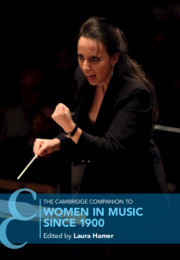Book contents
- The Cambridge Companion to Women in Music since 1900
- Cambridge Companions to Music
- The Cambridge Companion to Women in Music since 1900
- Copyright page
- Dedication
- Contents
- Figures
- Boxes
- Notes on Contributors
- Preface
- Abbreviations
- Part I The Classical Tradition
- 1 Women in Composition before the Second World War
- 2 Women in Composition during the Cold War in Music
- 3 Behind the Iron Curtain: Female Composers in the Soviet Bloc
- 4 Still Exceptional? Women in Composition Approaching the Twenty-First Century
- 5 On the Podium: Women Conductors
- 6 Soloists and Divas: Evolving Opportunities, Identity, and Reception
- In Her Own Words: Practitioner Contribution 1
- Part II Women in Popular Music
- Part III Women and Music Technology
- Part IV Women’s Wider Work in Music
- Appendix: Survey Questions for Chapter 14, The Star-Eaters: A 2019 Survey of Female and Gender-Non-Conforming Individuals Using Electronics for Music
- Select Bibliography
- Index
- References
5 - On the Podium: Women Conductors
from Part I - The Classical Tradition
Published online by Cambridge University Press: 17 April 2021
- The Cambridge Companion to Women in Music since 1900
- Cambridge Companions to Music
- The Cambridge Companion to Women in Music since 1900
- Copyright page
- Dedication
- Contents
- Figures
- Boxes
- Notes on Contributors
- Preface
- Abbreviations
- Part I The Classical Tradition
- 1 Women in Composition before the Second World War
- 2 Women in Composition during the Cold War in Music
- 3 Behind the Iron Curtain: Female Composers in the Soviet Bloc
- 4 Still Exceptional? Women in Composition Approaching the Twenty-First Century
- 5 On the Podium: Women Conductors
- 6 Soloists and Divas: Evolving Opportunities, Identity, and Reception
- In Her Own Words: Practitioner Contribution 1
- Part II Women in Popular Music
- Part III Women and Music Technology
- Part IV Women’s Wider Work in Music
- Appendix: Survey Questions for Chapter 14, The Star-Eaters: A 2019 Survey of Female and Gender-Non-Conforming Individuals Using Electronics for Music
- Select Bibliography
- Index
- References
Summary
Chapter 5 turns to the situation of women conductors. It considers the early women conductors of the twentieth century, many of whom, such as Ethel Leginska, founded and led their own women’s orchestras. It explores how – with the important exception of Veronika Dudarowa’s career in the USSR – the majority of women conductors lost opportunities following the general demise of the women’s orchestras during the Second World War. It also examines the re-emergence of women at the heads or orchestras in the later twentieth century, with a particular focus upon the career of Marin Alsop. It concludes by discussing the important work that Alsop and others, notably (in the UK) Alice Farnham, are doing through mentoring and training the younger generation of women conductors through such initiatives as Alsop’s Taki Concordia Fellowship and Farnham’s Women Conductors programme at the Royal Philharmonic Society.
Keywords
- Type
- Chapter
- Information
- The Cambridge Companion to Women in Music since 1900 , pp. 64 - 79Publisher: Cambridge University PressPrint publication year: 2021

